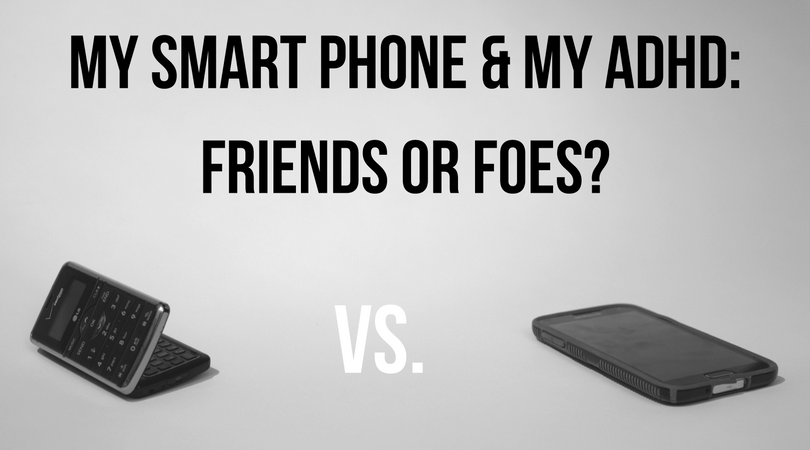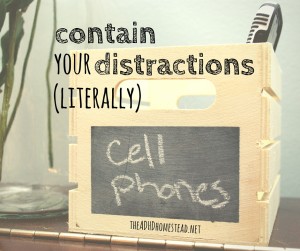Smartphones are a double-edged sword for adults with ADHD. I have a love-hate relationship with mine.
On one hand, it’s a Swiss Army knife of a device. It reminds me to take my meds. It puts my calendar in front of my face every time I unlock its screen. It condenses many tools — day planner, phone, camera, grocery list, file folders, and more — into one GPS-enabled device. I once misplaced it, and it told me where it was with a little blue dot on a map.
It’s also a huge distraction. Last month, I decided to take a break. I bought a dumb phone on eBay, and I deactivated my smartphone. Then, I asked myself: is life better this way?

The pros
I gained a lot from my week off. I took more pictures with my SLR. I read magazines instead of checking notifications. I went to brunch with friends, and didn’t even consider checking my phone in the car or during a lull at the table. I listened to a CD instead of Pandora while driving.
Speaking of driving, when I first learned to drive, I knew how to get everywhere. I’m not a visual thinker, and I didn’t have a map in my head, but I knew which roads intersected where. Now, I snap my phone into its dashboard mount and turn to my navigation app instead of using my eyes and brain. Like memorizing phone numbers, driving without a smartphone has become a lost art. It felt good to stretch those mental muscles again. I watched for road signs and landmarks on familiar routes, and I looked at a map ahead of time for new destinations.
Perhaps best of all, my phone was just a phone. I could make a call without being derailed by apps and notifications. When I first opened my dumb phone, I felt liberated. In a way, I was.
The cons
However, I quickly realized how much a smartphone can help someone like me.
For people with ADHD, convenience means more than comfort. Sure, it’s convenient to sync my Google Contacts across all my devices. It also protects me against lost business cards, or even a lost phone. It’s convenient to check my calendar while I’m at the dentist. It can also make the difference between cleanings every six months vs. every three years. Threaded text messages, where I can scroll through an entire conversation on one screen, are convenient, but something I already struggle to manage. Without that feature, I felt totally out of touch with my social group.
My phone tells me more important stuff, too. It tells me when (and whether) I took my meds this morning. It reminds me of birthdays, anniversaries, and deaths among those close to me.
In other words, my phone helps me manage my productivity, personal health, and social relationships. These are all areas of tremendous struggle for adults with ADHD. Features that provide convenience for most people can make or break relationships (or dental health) for us.
Where to go from here
 Because I still used my smartphone on wifi at home, I saw the biggest difference while running errands or spending time with friends. I’ve now reactivated it, and I intend to keep it. I also want it to spend more time in my bag, or in the cell phone bin at home. I’ve been considering a bluetooth cordless phone for my office/home, to imitate the experience of an old school landline. My smartphone-free week has convinced me this is a good idea.
Because I still used my smartphone on wifi at home, I saw the biggest difference while running errands or spending time with friends. I’ve now reactivated it, and I intend to keep it. I also want it to spend more time in my bag, or in the cell phone bin at home. I’ve been considering a bluetooth cordless phone for my office/home, to imitate the experience of an old school landline. My smartphone-free week has convinced me this is a good idea.
Which reminds me: Once upon a time, no one expected us to respond immediately to everything around the clock. Growing up, people my age didn’t have cell phones at all. We had landlines and answering machines. We sat down at a computer and waited for our modem to dial into our internet service provider.
I remember going to college and experiencing an always-on internet connection for the first time. I marveled at how easy it was to sit down for 30 seconds to check my email on the way out the door. I left AOL Instant Messenger open all the time. The internet wove its way into the fabric of my consciousness, no longer relegated to a time slot on a shared landline. Smartphone culture had, in a way, already begun.
In the end, my smartphone break wasn’t about the device, it was about mindfulness. Used intentionally, smartphones provide huge benefits. When minutes or hours pass by in front of the screen and we don’t even know what happened, we have a problem. We can counteract this by putting the phone in a designated place in the house, keeping it in our bag while we’re out, and/or disabling notifications. We can be judicious about which apps we install. My phone now rings audibly, but only vibrates for notifications. I’ll know if my kid’s school calls, but I can be more intentional about checking the other stuff.
Because my phone is only a tool if I use it wisely.
Hey there! Are you enjoying The ADHD Homestead?
Here's the thing: I don't like ads. I don't want to sell your attention to an advertising service run by the world's biggest data mining company. I also value my integrity and my readers' trust above all, which means I accept very few sponsorships/partnerships.
So I'm asking for your support directly. For the cost of one cup of coffee, you can help keep this site unbiased and ad-free.
Below you will find two buttons. The first lets you join our crew of Patreon pals and pledge monthly support for my work. Patrons also have access to my Audioblogs podcast. The second takes you to a simple donation page to pledge one-time or recurring support for The ADHD Homestead, no frills, no strings. Do whichever feels best for you!

